They Do It with Mirrors
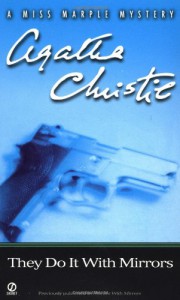 I did like it and, though it seemed quite obvious who the murderer was from an early stage (since that person talked to the police), I was still not so sure about the motives. I knew there was something wrong about the alleged poisoning of Carrie Louise, and I suspected there was no actual poison, yet I thought it was more about family secrets than money. On the other hand, I really enjoyed the process of thought that led *beep* and Miss Marple to the truth. It was interesting.
I did like it and, though it seemed quite obvious who the murderer was from an early stage (since that person talked to the police), I was still not so sure about the motives. I knew there was something wrong about the alleged poisoning of Carrie Louise, and I suspected there was no actual poison, yet I thought it was more about family secrets than money. On the other hand, I really enjoyed the process of thought that led *beep* and Miss Marple to the truth. It was interesting.Another thing I really liked was Carie Louise and how her character was handled (everyone believed her oblivious but she ended up being the most sensible and perceptive). However, I didn't like the whole business with Gina and the boys, or how Gina's character was written.
Welcome to the N.H.K.
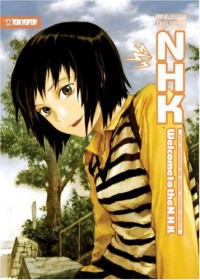 I had already read the manga adaptation and loved it, but I loved the novel even more. It does a much better work in giving you an insight into Satou's mind. I could relate so much to him it was scary. Actually, I think my timing for reading this was perfect, because the story touched several points that relate to my current situation and feelings. The thing is: when I started reading the book, I was becoming sort of an almost-hikkikomori (still enrolled in university, though). But now that I finally finished it, it looks like I changed directions. I guess seeing Satou coping with his issues made easier for me to deal with mine.
I had already read the manga adaptation and loved it, but I loved the novel even more. It does a much better work in giving you an insight into Satou's mind. I could relate so much to him it was scary. Actually, I think my timing for reading this was perfect, because the story touched several points that relate to my current situation and feelings. The thing is: when I started reading the book, I was becoming sort of an almost-hikkikomori (still enrolled in university, though). But now that I finally finished it, it looks like I changed directions. I guess seeing Satou coping with his issues made easier for me to deal with mine.Misaki was a pretty relatable character too. I can understand her and why she did everything she did.
Both Satou and Misaki were amazing characters and complemented each other. I loved the ending, specially when Satou told Misaki about the conspiracy and when they signed their hostage contract.
Even Yamazaki, a misogynistic pedophile, fit perfectly in the story. He was unlikable, but his character made
sense and felt realistic. Men like him exist. They're a result of the damage patriarchy does. And I liked the contrast between his and Satou's reactions to their own lolicon tendencies. While Satou acknowledged how wrong it was and went through a moral dilemma, Yamazaki had none of that. He justified himself and his feelings as a mean to cope with his frustration and previous rejections.
What I found appealing about the characters around Satou (Misaki, Yamazaki and the female senpai) was that they all had a reason to be who they were. There was a backstory that shaped them they way we see them. And each story told a bit about japanese society too.
I do hope people who haven't been in Satou's or Misaki's shoes, people who have never felt afraid of crowds or of social interactions, people who have never felt depressed, suicidal or worthless, and happen to come across this book, can understand a little more after reading it.
A Clockwork Orange
 I read this book with such high expectations I found it a bit disappointing. It was a good book, but lacking. After knowing that it was written in three weeks, now I get why.
I read this book with such high expectations I found it a bit disappointing. It was a good book, but lacking. After knowing that it was written in three weeks, now I get why.So, the things I didn't like:
1- I get the Christianity morals played a part in asking the question about free will, but it was too much Christianity for me to take this book seriously. It should have stopped after Alex's release. I felt that it just didn't go with the rest of the world-building nor Alex's character.
2- The second part was a bit boring until the experiment began, and I felt the prison life looked too "soft-core" for the world shown in the first part. It just didn't seem coherent.
3- The final chapter. WTF? I can make two different interpretations:
A. Alex just got over violence by himself and became less bad and *insert Christian reflexion here*.
B. Alex became brainwashed by society in a subtler way.
If Burgess tried to say A (most popular opinion from what I've read), the end just sucks. It's silly and out-of-character for Alex.
If Burgess tried to say B, it's not a bad end per se, just a good idea but poorly-executed.
I finished reading it last night, and I went to bed asking myself if I had liked the book or not. I guess I did like the book, but it didn't impress me. And I was expecting to be impressed. I was expecting a great dystopian classic, and I got an average dystopian novel. On the other hand, I think the main character worked perfect, because the real reflexion about free will or imposed good comes from the experiment done to a despicable person you can't possibly feel empathy for. Undoubtedly, the world would be better without Alex. He doesn't have any redeeming qualities. Yet free will is something too precious to be paid as a price.
And that's what this novel gets 3 stars despite all the flaws I found. Had it been better executed, it would have been an amazing book.
Last Sacrifice
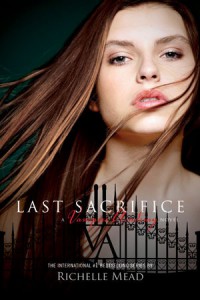 I loved this book for the plot, the investigation about the murder, the politics, the unexpected surprises like Jill and Tasha -it was obvious once Rose realized it after listening to Ian, but before that, I didn't see it coming!!- and Lissa's character development. However, the Rose-Dimitri-Adrian triangle was poorly written in comparison. I do like Rose and Dimitri together, but their relationship could have used better development. And both Rose and Adrian got things right during their last conversation. I felt so bad for Adrian, I really liked him. But I acknowledge that he wasn't perfect either. I didn't mind Rose cheating on Adrian (I mean, I didn't mind her making a mistake that would hurt a person she cares about because it could have been useful for the story), but I expected more guilt from Rose's part, or just more development. I like flawed characters yet I like the writing to make them look flawed, not to just redeem every simple mistake they make simply because they're so cool. Besides, I still think the whole "Dimitri doesn't want Rose anymore because he can't love and angst angst angst" was only meant to extend the drama and didn't work at all.
I loved this book for the plot, the investigation about the murder, the politics, the unexpected surprises like Jill and Tasha -it was obvious once Rose realized it after listening to Ian, but before that, I didn't see it coming!!- and Lissa's character development. However, the Rose-Dimitri-Adrian triangle was poorly written in comparison. I do like Rose and Dimitri together, but their relationship could have used better development. And both Rose and Adrian got things right during their last conversation. I felt so bad for Adrian, I really liked him. But I acknowledge that he wasn't perfect either. I didn't mind Rose cheating on Adrian (I mean, I didn't mind her making a mistake that would hurt a person she cares about because it could have been useful for the story), but I expected more guilt from Rose's part, or just more development. I like flawed characters yet I like the writing to make them look flawed, not to just redeem every simple mistake they make simply because they're so cool. Besides, I still think the whole "Dimitri doesn't want Rose anymore because he can't love and angst angst angst" was only meant to extend the drama and didn't work at all.Speaking about Rose, I would have loved to see her taking active responsibility for the damage she did to her friends (like Eddie, Sydney and Jill). I know she felt guilty (and I'm so glad Adrian pointed the facts out, or Rose might have just stayed oblivious), but she should have done something about it. That's Rose-ish.
Nevertheless, aside from all the Rose-Dimitri-Adrian-related stuff, the other aspects of the book were great and made it deserve the 4th star.
P.S.: No offense, but after reading certain reviews... I get you don't like Rose and that's ok and makes a lot of sense and you have a lot of reasons not to like her, but some people should go choke on their internalized sexism and slut-shaming.
Heartless (Parasol Protectorate #4)
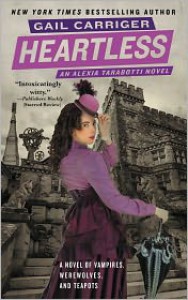 When the one and only thing I can say I disliked in this book was Alexia's attitude about the suffragettes (I would have loved to see her supporting them instead), I suppose Heartless deserves its 5 stars. It's not a book everyone would love; yet, for those who get it, it's truly amazing. Others might enjoy it but not be able to see the authentic appeal. I feel bad for them.
When the one and only thing I can say I disliked in this book was Alexia's attitude about the suffragettes (I would have loved to see her supporting them instead), I suppose Heartless deserves its 5 stars. It's not a book everyone would love; yet, for those who get it, it's truly amazing. Others might enjoy it but not be able to see the authentic appeal. I feel bad for them.The Parasol Protectorate has always been wonderfully witty, hilarious and creative. In addition, Heartless definitely wins at plot, secondary character development, shocking revelations and bad-ass heroine (the world needs more eight-month pregnant women being amazing and brilliant in non-pregnancy-related things).
Spirit Bound
 If I were to rate this book exclusively in terms of simple and pure enjoyment, I would give it 4 or 5 stars. Because I have to admit it: I couldn't put in down. I was so into it I always found myself needing to read the following chapter immediately. But, at the same time, I have to be honest: it wasn't the best book in the series. As much as I loved the events that take place in it (let's say there were 3 main events), the first of them, as exciting as it was, left me with a voice in my head telling me it was just TOO easy. Seriously, I know Rose is the badassest badass ever and Lissa has super compulsion powers, but I was expecting much more from a High-High-security prison.
If I were to rate this book exclusively in terms of simple and pure enjoyment, I would give it 4 or 5 stars. Because I have to admit it: I couldn't put in down. I was so into it I always found myself needing to read the following chapter immediately. But, at the same time, I have to be honest: it wasn't the best book in the series. As much as I loved the events that take place in it (let's say there were 3 main events), the first of them, as exciting as it was, left me with a voice in my head telling me it was just TOO easy. Seriously, I know Rose is the badassest badass ever and Lissa has super compulsion powers, but I was expecting much more from a High-High-security prison.I actually liked how Dimitri was turned back by Lissa, yet I believe it happened too fast. It should had taken more time from Lissa to master, if not the charming of the stake, the act of staking. One day she couldn't even stake a pillow, and the next she was ready to stake a powerful Strigoi in the middle of flames. Besides, while I do think Dimitri's post-Strigoi guilt and trauma makes sense and feels realistic, after a couple of chapters I found all the drama being too much. I felt like the author just wanted to avoid getting Dimitri and Rose back together before the last book.
What I did love was the unexpected turn of things nearby the end. It makes me doubt between giving the book its fourth star or keeping them at three. However, at the same time, I think Rose is too great of a character to be spending Adrian's money like he was her own personal trust fund, again. I was ok with Adrian funding her trip to Russia, but Rose still using his money carelessly after getting back and starting to formally date him didn't feel right.
So, in the end, it's 3.5 stars.
Blameless (Parasol Protectorate #3)
 Absolutely hilarious, this was my favorite book in the series so far. Yes, it has several issues, and it might not be such a great book by more objective standards, but I love it. I think the dialogue alone deserves all the stars.
Absolutely hilarious, this was my favorite book in the series so far. Yes, it has several issues, and it might not be such a great book by more objective standards, but I love it. I think the dialogue alone deserves all the stars.I mean, how can you not love a book so full of lines like:
“I mean to say, really, I am near to developing a neurosis - is there anyone around who doesn't want to study or kill me?"
Floote raised a tentative hand.
"Ah, yes, thank you, Floote."
I had so much fun reading this!
Though I would have preferred Alexia taking more time to forgive Conall, and/or a deeper conversation regarding the infant-inconvenience (note: anyone who comes up with the term "infant-inconvenience" is a genius), the ending was ok.
And I approve of not-actually-a-fool Ivy!
I really hope to see further development of Biffy and Lord Akeldama's relationship in the next book. I totally love those characters! And Professor Lyall too!
Allegiant
 The best book in the series. My favorite part of it -well, of the series as a whole- was the idea of how everything we know could turn out to be a lie. Over and over again. And the detail about GP people believing there hadn't been wars before the Purity War, that GP people couldn't start wars. Because it showed how they were manipulated by the government into believing false historical facts true. It reminded me a little of how history was dealt with in Orwell's 1984. If you control the present, you control the past.
The best book in the series. My favorite part of it -well, of the series as a whole- was the idea of how everything we know could turn out to be a lie. Over and over again. And the detail about GP people believing there hadn't been wars before the Purity War, that GP people couldn't start wars. Because it showed how they were manipulated by the government into believing false historical facts true. It reminded me a little of how history was dealt with in Orwell's 1984. If you control the present, you control the past.Like always, there were things I liked and things I didn't like, but I think the one that bothered me the most was Evelyn just changing her mind about everything she fought for and believed in during Insurgent just because of her son. I mean, it was quite out of character for her. I would have loved some actual development which made her take said decision.
And, as much as I wanted Tris to live and be happy with Four, her death didn't bothered me. Actually, I liked it. I guess I'm too much into GoT...
I loved having Tobias' POV, and I think Roth made a wise decision adding it. Tris' fate apart, having another character's POV allowed the reader to experience the whole picture of what was happening. However, I also think Tobias' voice should had been more distinctive - it sounded too similar to Tris' sometimes.
His character development, on the other hand, was pretty good.
The Notebook
 Another case of both 'liked the movie more than the book' and 'great idea but poor execution'. A shame, because I really wanted to like this book. Maybe romance novels just aren't my thing.
Another case of both 'liked the movie more than the book' and 'great idea but poor execution'. A shame, because I really wanted to like this book. Maybe romance novels just aren't my thing.
Angels & Demons
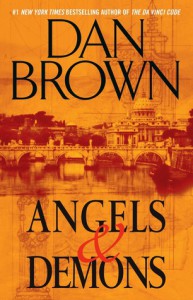 It's such a shame to give this book just two stars (actually, 2.5 stars), because the story -or the idea behind it- is quite good. I really wanted to like it, mainly because I had seen the movie and enjoyed it. However, I couldn't get past several issues with the book that made me take a couple of stars away:
It's such a shame to give this book just two stars (actually, 2.5 stars), because the story -or the idea behind it- is quite good. I really wanted to like it, mainly because I had seen the movie and enjoyed it. However, I couldn't get past several issues with the book that made me take a couple of stars away:- I hated the writing. Seriously, that's probably my main complaint. Had this book been better written, I would probably have enjoyed it a lot more.
- Too many errors and inaccuracy for someone who claims the things and places in his book to be 'factual'. I wouldn't even care if the author hadn't claimed that, but if you say X is factual, you should investigate more about X in order to be accurate. And this goes for everything: history, art, physics, etc.
- I didn't like the way the characters were written (except, maybe, Vittoria - I think I liked her). Besides, most of the paragraphs trying to bring character backstory or inner thoughts didn't work at all - they felt out of place.
- Marty Stu and Mary Sue. And they get insta love. And this isn't even YA.
- The Hassassin: 100% cardboard.
- Vittoria's kidnap. How was this relevant to the plot? At least she got free by herself in the end. That was the only redeeming aspect of a totally unnecessary use of the damsel in distress trope.
- Don't get me started with the scene in the helicopter... I'm so glad they changed that in the movie script.
Just a curiosity: After reading the book, I really don't understand why so many (not-actually-smart) people accuse it of being "anti-Christian". In fact, if you ask me, it felt Christian-friendly for me. Maybe too much.
Insurgent
 I liked Insurgent way more than Divergent. Lots of improvement here, especially in story and character development. The characters seemed deeper and more real than those in the previous book. And Tobias and Tris' relationship finally started to make sense to me. I still don't know how to feel about them, though; sometimes I like them and sometimes I don't. I guess I would have liked them more if the romantic stuff had remained in the back seat a bit more. I liked how Four starts to appear more flawed, but sometimes it felt too similar to certain character from certain book...
I liked Insurgent way more than Divergent. Lots of improvement here, especially in story and character development. The characters seemed deeper and more real than those in the previous book. And Tobias and Tris' relationship finally started to make sense to me. I still don't know how to feel about them, though; sometimes I like them and sometimes I don't. I guess I would have liked them more if the romantic stuff had remained in the back seat a bit more. I liked how Four starts to appear more flawed, but sometimes it felt too similar to certain character from certain book...I'm not going to say it was not predictable, because I saw the final revelation coming, among other things, but it wasn't nearly as predictable as Divergent either. It had some predictable parts and other not-so-predictable ones. Sometimes I suspected "X" was about to happen but I didn't know the motivation behind it.
Again: predictable or not, the book sucked me in. By the middle of it I was so engaged I couldn't put it down. I have to give it credit.
Divergent
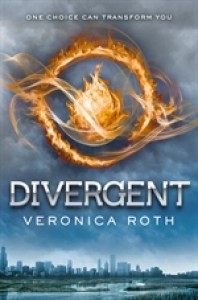 The truth is: I liked this book a lot. I really enjoyed it. However, I have to admit that the world construction wasn't that good and the story was TOO predictable. Actually, I feel like the only three things I wasn't entirely expecting were Al trying to kill Tris, Four being called Four because he only had four fears (I thought he had been the fourth jumper or something sillier), and Tris' mother saving her instead of Four or Caleb.. Everything else was like "I guess X is going to happen -> Some pages later, X happens".
The truth is: I liked this book a lot. I really enjoyed it. However, I have to admit that the world construction wasn't that good and the story was TOO predictable. Actually, I feel like the only three things I wasn't entirely expecting were Al trying to kill Tris, Four being called Four because he only had four fears (I thought he had been the fourth jumper or something sillier), and Tris' mother saving her instead of Four or Caleb.. Everything else was like "I guess X is going to happen -> Some pages later, X happens".Nevertheless, I couldn't stop reading. Even if I knew what was going to happen, I still kept looking forward to reading it. The story captured me anyway.
Tris herself wasn't that relatable for me, but I could relate a lot to her circumstances. When she arrived to the Dauntless place I thought I would never be able to stand a single day there, but when the initiation process finally ended I felt that maybe, just maybe, I could do it. Her personal journey was my favorite part of the book, I guess.
I liked Four, yet I felt his feelings for Tris were like "hey, I just met you, and this is crazy, but I'm going to like you". Yeah, I actually fangirl about them, but still...
I'm still torn between giving this book 3 or 4 stars; if I rate it by my usual standards, I have to give it 3, but if I rate it based on my own enjoyment, it's a 4. I guess I'm sticking to the usual (even if it's not 100% consistent - but hey, whose ratings are?).
The Book Thief
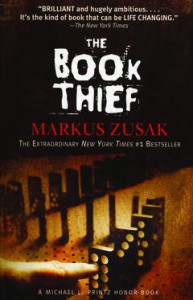 This is one of those books you (well, maybe not you, but at least me) don't stop to think if they're actually that good or not, you just love them. Because the book does something to you. Sometimes I'm about to rate a book that meant a lot to me 5 stars when I realize there's a "but", and I might end up rating it 4; however, no voice saying "but" was heard as I rated The Book Thief.
This is one of those books you (well, maybe not you, but at least me) don't stop to think if they're actually that good or not, you just love them. Because the book does something to you. Sometimes I'm about to rate a book that meant a lot to me 5 stars when I realize there's a "but", and I might end up rating it 4; however, no voice saying "but" was heard as I rated The Book Thief.After all, I can't help but loving a book called like that. And specially one featuring an exceedingly likeable accordionist and a Jewish fist-fighter who writes beautiful stories over painted pages.
 1
1
The Shadowhunter's Codex
 As "The Codex", it turns out a little disappointing, because it seems more like a guide for new shadowhunters or a shadowhunter texbook (seriously, it even has activities!). But as a textbook, it's fun and has some interesting information for fans. And Simon's comments are the best.
As "The Codex", it turns out a little disappointing, because it seems more like a guide for new shadowhunters or a shadowhunter texbook (seriously, it even has activities!). But as a textbook, it's fun and has some interesting information for fans. And Simon's comments are the best.





